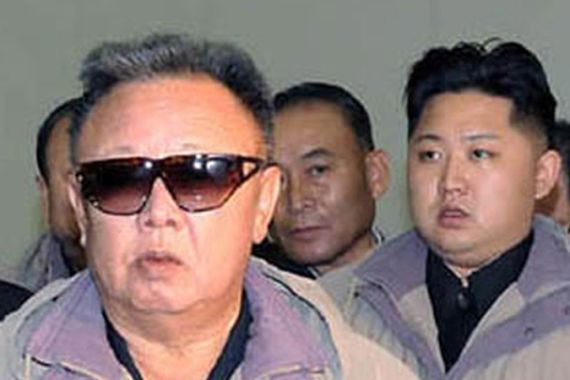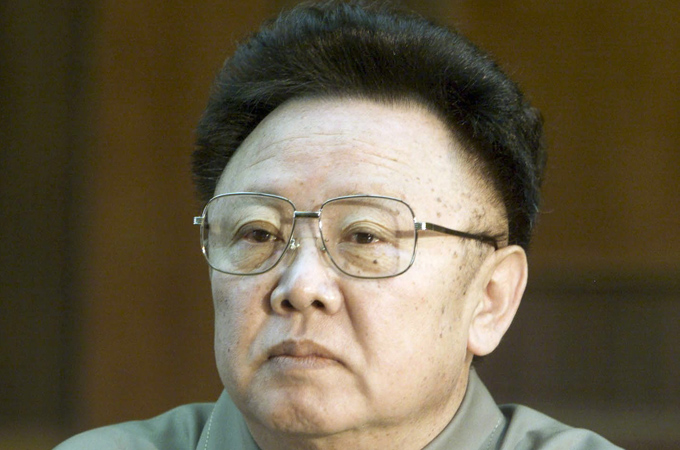Young Kim is in the house
The old Kim is gone and the new Kim is in, but not much will change in the land of the Kim family dynasty.

 |
| There is not much uncertainty that comes with Kim Jong-il’s death [EPA] |
Nobody knows what’s really going on in North Korea right now, apart from steady cataracts of tears – whether they are regime-imposed or not. The only certainty is that Dear Leader Kim Jong-il’s third son – the young, Switzerland-educated Kim Jong-un – will perpetuate North Korea’s family dynasty.
In the beginning, there was Great Leader Kim Il-sung, a somewhat iconic anti-imperialist figure across many developing world latitudes, particularly in the 1950s. Then came the Dear Leader. Now what? The Most Cherished Leader?
The Dear Leader’s bouffant hairdo, his platform shoes, his exotic car collection and his fascination with Hollywood are the makings of pop folklore. But what’s really keeping Western think-tanks in freak out mode is to know what will happen to North Korea’s military discipline and its formidable nuclear weapons programme.
First, let’s end this war
I was in North Korea last year for the Dear Leader’s birthday. Known for being a mighty hermit, he was nowhere to be seen. Pyongyang, though, somewhat partied, North Korea-style. I was hoping to come back in 2012 to venture deeper in the countryside and see how “invisible” North Korea would react to the huge celebrations surrounding the 100th anniversary of the birth of the Great Leader, who died in 1994.
I wonder what my lovely translator, a graduate in English literature named Jang Hyon Il, will be thinking about what she certainly rates as a larger-than-life tragedy. We still haven’t got a diatribe – yet – by apocalyptic, unofficial Dear Leader spokesman to the West, Kim Myong-chol. So I grabbed a collar of wooden beads I got from an angelical monk at a monastery near Kim Il-sung’s temple carved inside a rock to try to divine the future.
First of all, nobody should expect a North Korean spring. As much as the masses toil as if they lived in medieval times, and as much as some dream of a communism that really works to the benefit of the people, it won’t happen because the North Korean military won’t let it happen.
Last year I was also told in clear terms that there can only be some sort of understanding with the US if Washington and Pyongyang sit down to formally end the Korean War (which is technically still going on).
That would – in theory – gradually come from the (re)commencement of the Beijing-conducted six-party talks on North Korea’s nuclear programme, which have been stalled since December 2008.
Now all eyes will be on the young Kim. What won’t change is that as long as Washington doesn’t sign a peace treaty acknowledging the end of the war and pay reparations, nothing will really move.
The Dear Leader chose the young Kim over two older brothers. The favourite, for a while, was former international playboy and Macau resident Kim Jong-nam. His penchant for la vida loca though didn’t sit well with Kim Jong-il.
| Life after North Korea’s Kim Jong-il |
Crucially, Kim Jong-un was made a four-star general by the Dear Leader. This means nothing in practice: He has no military experience, although is credited with information technology wizardry. The generals that really matter in North Korea are hardcore, old guard revolutionaries now in their 80s.
As all matters Kim dynasty-related, the Shakespearean overtones are fascinating. The young Kim will have to deal with the Dear Leader’s powerful wife, Kim Ok, his extremely devious aunt, Kim Kyung-hui, and her equally scheming husband, Jang Song-thaek.
Jang is one of only four vice-chairmen of the National Defence Commission, the holy of holies in North Korea. The former chairman was – you guessed it – the Dear Leader himself.
International Kimologues will now be sharpening their microscopes to learn whether the young Kim will be a shark or a sardine when it comes to navigating between the family, an irascible bunch of generals, and the Darth Vader-esque Jang.
What’s certain is that for all practical purposes, there will be a sort of military junta running the show behind young Kim.
Ain’t no sunshine when he’s gone
Predictably, down south, Seoul is burning with anticipation, mostly at government levels. Who is this young Kim really? Is he a warmonger? Is he going to incinerate us? Or will be pull a Mandela?
The majority of people in South Korea basically expect their government – whatever its political inclinations – to manage the North.
In fact the upcoming 2012 elections may point to the left coming back to power. This means the return of the “sunshine” policy – launched by the late president Kim Dae-jung, who flew to Pyongyang for the landmark inter-Korean summit in June 2000.
The late president Roh Moo-hyun – who went to a summit in Pyongyang in October 2007 – was also a sunshine policy practitioner. This is as good of an appeasement strategy as any, featuring lots of aid with no strings attached. Certainly beats being threatened by a “sea of fire” from Pyongyang.
Many South Koreans instinctively seem to comprehend that the rationale up north is that what’s good for the Kim family dynasty is good for North Korea. That implies no regime change whatsoever. After all, all of the North Korean militarised elite pass down their privileges from generation to generation.
But then there’s also the nasty economic question. The economy in the North could well profit from a Deng Xiaoping-style shock – a “socialism with Korean characteristics”. But the Kim dynasty and the militarised apparatus surrounding it tend to worry most of all about the political and social reverberations of too much economic freedom.
North Korea’s key partner remains Beijing. Chinese investment will keep flowing – parallel to diplomatic support. Thus Beijing has the best of both worlds: It keeps a nuclear ally and it perpetuates the status quo of a divided Korean peninsula, meaning that there’s no reason to believe the ascension of young Kim will substantially alter the equation in northeast Asia.
Pepe Escobar is the roving correspondent for Asia Times. His latest book is called Obama Does Globalistan (Nimble Books, 2009).
The views expressed in this article are the author’s own and do not necessarily reflect Al Jazeera’s editorial policy.
